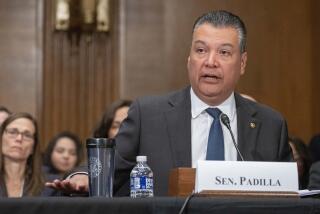White House Picks Up GOP Ally on Health Care Plan : Congress: Moderate Sen. James Jeffords of Vermont agrees to be co-sponsor of measure. First Lady’s marathon testimony continues.
WASHINGTON — The Clinton Administration, crusading to sell its health care plan on Capitol Hill, won its first GOP convert Wednesday as moderate Sen. James M. Jeffords of Vermont agreed to sign on as a co-sponsor of the White House bill that will be submitted to Congress within a few weeks.
Jeffords made his announcement as First Lady Hillary Rodham Clinton testified before the Senate Labor and Human Resources Committee, of which he is a member.
“I am pleased to be the first, but I am absolutely confident I will not be the last” Republican supporting the Administration bill, Jeffords said as he stood beside committee Chairman Edward M. Kennedy (D-Mass.).
Jeffords’ support, Kennedy noted, is “enormously important and very significant.”
Although President Clinton was able to pass his budget plan on Democratic votes alone, the dynamics of the health care debate are vastly different because that bill will be vulnerable to a GOP filibuster, a tactic Republicans used successfully to kill the Administration’s economic stimulus package.
All sides agree that the President’s health care plan has virtually no chance of passing unless it has at least a handful of Senate Republicans supporting it.
In her second of three days of marathon testimony, Hillary Clinton--only the third First Lady to appear before Congress--continued to reap accolades from Democrats and Republicans, who praised the role she had played as chief architect of the Administration’s health care proposal.
Once again, she spoke of the inadequacies of the current system, reciting facts and figures but weaving in her own experiences as the daughter of a dying man and a mother discovering that her daughter’s pediatric checkups were not covered by her health insurance plan.
The only testy exchange came during her appearance before the House Education and Labor Committee.
Rep. Dick Armey (R-Tex.), third-ranking House GOP leader and one of its most confrontational members, had suggested earlier that the health care plan amounted to economic euthanasia. He called it “a Dr. Kevorkian prescription for the jobs of American working men and women”--a reference to the Michigan doctor who has helped more than a dozen terminally ill people commit suicide.
In questioning Hillary Clinton on Wednesday, Armey again criticized the plan, adding that he planned “to make the debate, the legislative process as exciting as possible.”
“I’m sure you will do that, Mr. Armey--you and Dr. Kevorkian,” the First Lady shot back.
Armey, red-faced at the applause that erupted among Democrats on the panel, laughed and countered: “I have been told about your charm and wit and, let me say, the reports on your charm are overstated and the reports on your wit are understated.”
It was not the first such faceoff between the two. Earlier this year, Armey had compared the First Lady’s writings and statements to Marxism. At their next meeting, she told him: “I don’t think I look like Groucho Marx.”
A spokeswoman for the First Lady described Armey’s statements as “personal attacks,” but he insisted they were merely “friendly repartee. . . . She can give it out and she can take it.”
While most lawmakers praised the First Lady in the most lavish terms--comparing her to historical figures ranging from Martha Washington to Eleanor Roosevelt to Abraham Lincoln--they continued to express doubts about various aspects of the health care plan.
Conservatives questioned whether a heavier government involvement in the nation’s health care system will actually produce the savings promised by the Administration. Liberals said they feared that consumers would suffer in the drive to cut costs.
“I look at this committee hearing and your presence with a sense of history because the pricklings in my fingertips tell me that after over a half-century of political struggle . . . we are as close as we have ever been as a nation to adopting some kind of major health care reform that will provide humane, dignified, affordable care for people,” Sen. Paul Wellstone (D-Minn.) told the First Lady.
But Wellstone, a proponent of a more radical change to Canadian-style, government-financed system, also added: “I’m worried that middle-class people might get the short end of the stick.”
The First Lady will make her fifth congressional appearance of the week today before the Senate Finance Committee.
More to Read
Get the L.A. Times Politics newsletter
Deeply reported insights into legislation, politics and policy from Sacramento, Washington and beyond. In your inbox three times per week.
You may occasionally receive promotional content from the Los Angeles Times.










